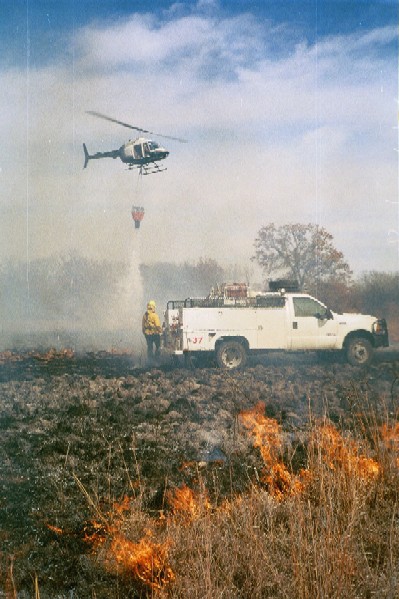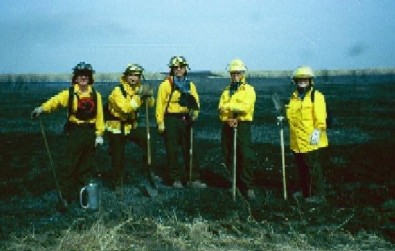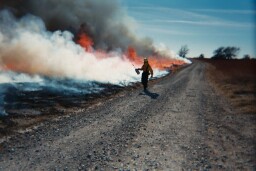Wildland Fire Management
Fall 2003
UPDATED: October 27, 2003

Course Overview

Course Overview
Fire
is one of the oldest natural phenomena. From time immemorial, fire has
shaped
the evolution of plants, animals, ecosystems, and even the course of
human
civilization. Our ability to both create and control this potentially
destructive form of energy makes fire unique among the major
disturbances that
influence and shape ecosystems, and as such, the active use of fire has
become
a key technique in conservation management.
The
tremendous forest and range fires of 2000 and 2002 have shown us the
deadly and
destructive consequences of the past 100 years of wildland fire
suppression.
Recent policy initiatives have increased the controversy and the
confusion over
wildland fires, particularly in the "red zone," the wildland/urban
interface
(WUI). Many new residents, especially in rural areas of Texas, build
expensive
homes with poor access in areas that have extremely high potential for
destructive wildfire, with little to no understanding of the risks to
themselves or to the emergency personnel who must respond to the
inevitable
conflagrations.
This
course will explore the role fire plays in the natural landscapes and
urban
interfaces of North America, how the interplay of science and myth has
shaped
wildfire management, and how the importance of fire management is
rapidly
increasing with new advances in understanding and its changing status
in public
opinion. This course will provide practical instruction in fire
behavior, fuel
and fire assessment methods, and fire management techniques.
FIRE
LINKS
(www.ias.unt.edu/~llela/firelinks.htm)
FIRE
PICTURES
(www.ias.unt.edu/~llela/wildfire.htm)
|
ENV 356 940.369.7165 llela@unt.edu |
ENV 320J 940.565.2991 hunter@unt.edu |
WH 360 940.565.3786 robinson@unt.edu |
Class will be held in ENV 391, Thursday 6-9pm
Course Requirements
Students
will be expected to attend class and participate in class discussions. Grades will be based upon three in-class
exams and active participation in the concluding workshop. Graduate
students
will be expected to write a paper based upon a fire ecology or
management topic. Grading will
be as follows:
|
|
Undergraduates |
Graduates |
|
Test One |
25% |
20% |
|
Test Two |
25% |
20% |
|
Test Three |
25% |
20% |
|
Firewise
Workshop |
25% |
20% |
|
Paper |
|
20% |
·
The
three tests will allow you the opportunity to apply your knowledge to
specific
problems or issues in wildland fire management, and will consist of
multiple-choice type questions, terminology, evaluations of the
assigned
readings, and applied problem solving exercises. More information will
be
provided in class.
·
The
Firewise workshop will allow you the opportunity to apply your
knowledge to a
simulation exercise that addresses some of the real-world concerns and
issues
that individuals, communities, and emergency response (especially fire)
personnel face in the wildland urban interface. More information will
be
provided in class.
·
Graduate
student essays will be publication-quality and will reflect graduate
level
knowledge and application of the subject matter to a wildland fire
issue of
their choice. More information will be provided in class.

Readings
From your favorite bookstore (you will need
to order it):
True,
A. 2001. Wildfire: A
reader. Island Press.
Obtain in class (cost $8.00):
US Forest Service. 1989. A
guide for prescribed fire in southern forests. Technical Publication
R8-TP 11. NFES
2108. National Interagency Fire Center.
National Wildfire
Coordinating Group. 1994. Introduction to wildland fire behavior. NFES
1860.
National Interagency Fire Center.
National Wildfire
Coordinating Group. Firefighter’s Guide. NFES 1571. National
Interagency
Fire Center.
National Wildfire
Coordinating Group. Appendix B of Fireline Handbook, NWCG Handbook 3. NFES
2165. National Interagency Fire Center.
Other readings will be
distributed in class as needed.
Reading
schedule:
NFES and Firewise publications are meant to reinforce course material presented in class—so, if you hear it in class, and you see it these books, you will probably see it on the test!
The Wildfire Reader essays will not be discussed in class. These readings provide a wider perspective and specific social contexts on the technical issues we discuss in class, and thus (like the technical information) serve as preparatory material for the Firewise workshop at the conclusion of the semester. As something of a bonus: they’re actually fun to read—no dry academic drivel. The readings will be on the tests as short essay questions. For example, “Part 1: In the style of a movie review (2 sentences maximum), present the main point of [a reading] and why it’s worth a read. Part 2: Discuss your own opinions and thoughts that were generated from this same reading.”
Note that more reading is required as the course progresses. PLAN ACCORDINGLY!
Test 1: Fire Behavior
National Wildfire Coordinating Group. 1994. Introduction to wildland fire behavior. NFES 1860. National Interagency Fire Center.
Test 2 (October 23):
Firefighting
National Wildfire Coordinating Group. 1986. Firefighter’s Guide. NFES 1571. National Interagency Fire Center.
Wildfire Reader: pages 63-78, 90-112, 113-125, 156-169, 196-199
Test 3 (November 20):
Fire Ecology and Urban/Wildland
Interface
US Forest Service. 1989. A guide for prescribed fire in southern forests. Technical Publication R8-TP 11. NFES 2108. National Interagency Fire Center.
National Wildfire Coordinating Group. Appendix B of Fireline Handbook, NWCG Handbook 3. NFES 2165. National Interagency Fire Center.
Firewise Readings (to be distributed)
Wildfire Reader: pages 34-45, 53-62, 79-83, 170-176, 187-195, 200-208, 215-222

Guest
speakers in various fire management positions will present their views
and
experiences in wildland fire ecology and management over the course of
the
semester, so all dates and topics are tentative and subject to change,
primarily
based upon speaker availability. Links in the schedule are Adobe pdf
files of the lecture slides (note: there are some formatting errors
between Powerpoint and Adobe. Sorry.).
|
Date |
Topics |
|
August 28 |
Discussion
of syllabus |
|
September
4 |
|
|
September
11 |
|
|
September
18 |
|
|
September
25 |
|
|
October 2 |
|
|
October 9 |
|
|
October
16 |
No Class
(so spend some time studying!) |
|
October 23 |
|
|
October 30 |
Maria Moreno, UNT: Evaluating fuel loads and models in a tallgrass
prairie |
|
November
6 |
|
|
November
13 |
|
|
November
20 |
|
|
November
27 |
No Class:
Thanksgiving Holiday |
|
December4 |
|
FIRE
LINKS
(www.ias.unt.edu/~llela/firelinks.htm)
